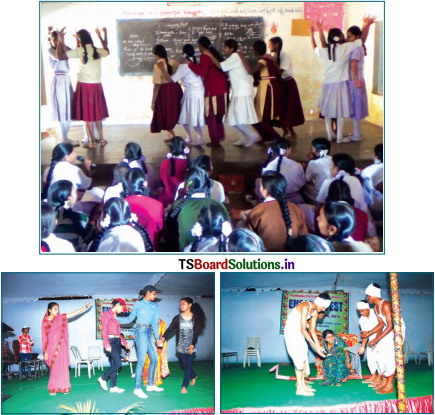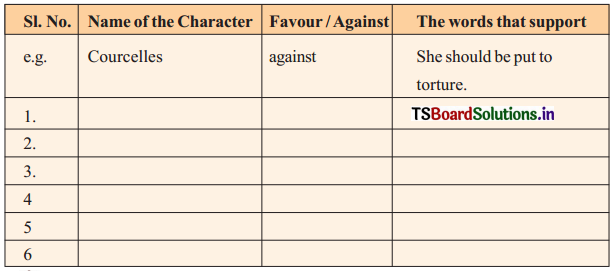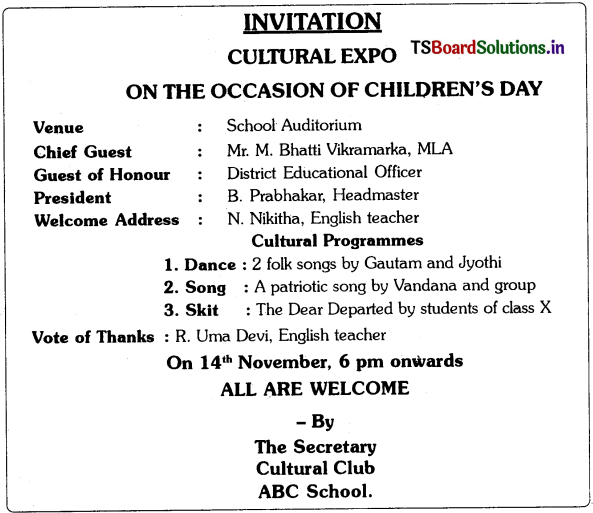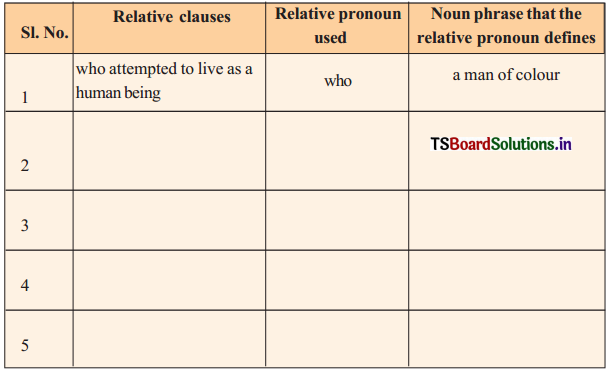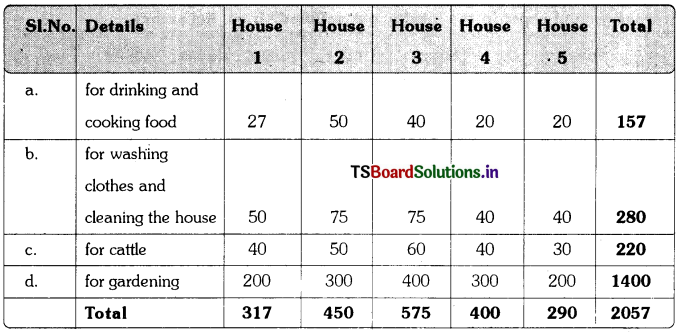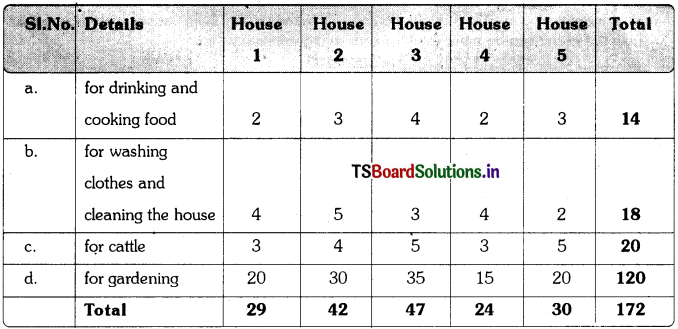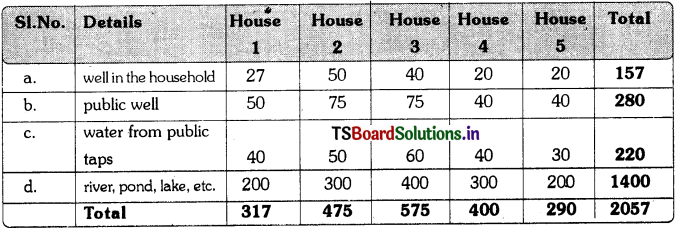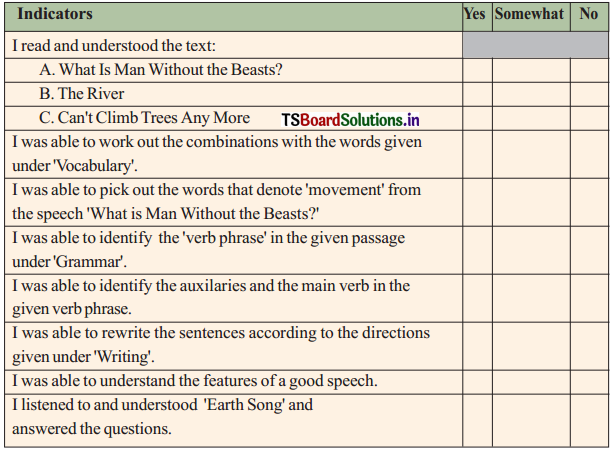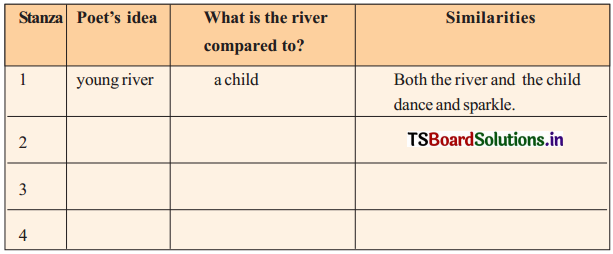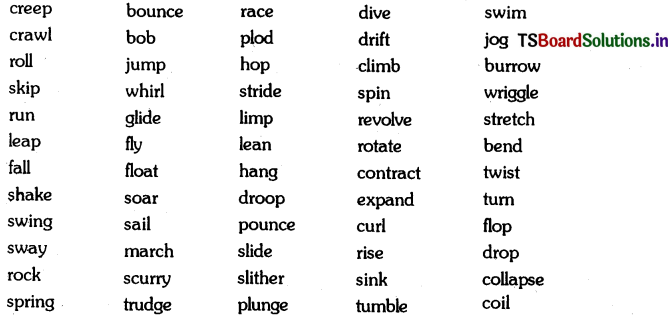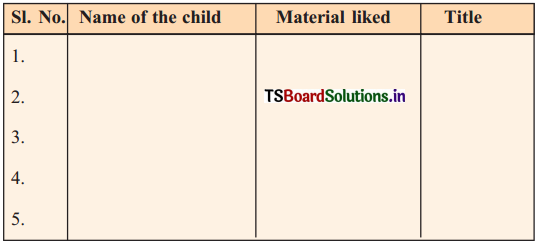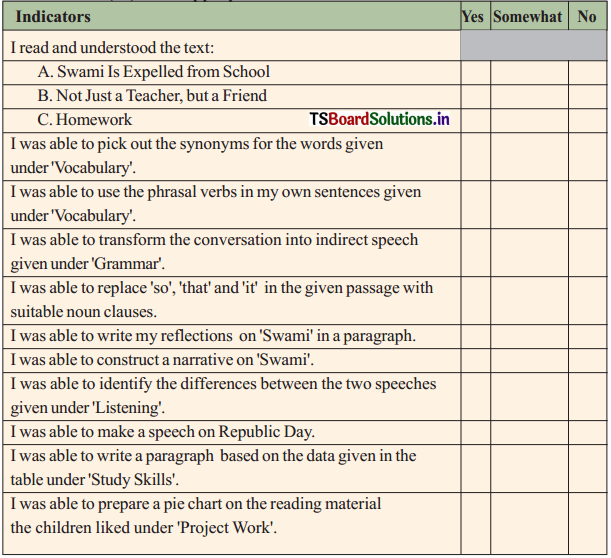Telangana SCERT 9th Class English Guide Pdf Telangana Unit 3A Swami is Expelled from School Textbook Questions and Answers.
TS 9th Class English Guide Unit 3A Swami is Expelled from School
PRE-READING (Motivation/Picture Interaction) :
Look at the picture and answer the questions that follow.
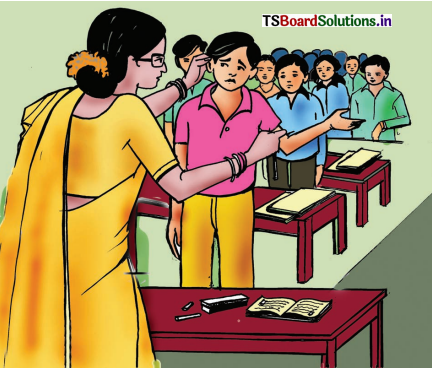
Question 1.
Do you approve of the action of the teacher as depicted in the picture? Give at least one reason for your opinion.
Answer:
No. I usually don’t approve this kind of action of the teacher because corporal punishment should not be initiated against children. It is common with the school children behaving improperly at their tender age. They don’t know the importance of education and how to behave. Teachers need great patience to change them.
Question 2.
Suggest ways of maintaining discipline that do not involve physical or verbal abuse.
Answer:
Discipline is a way to guide and manage a child’s behaviour. It is based on the quality of a child’s relationship with the teacher. The teacher may give specific positive reinforcement. This includes smiling, greeting, praising, etc. The teacher should make his/her children realize the importance of discipline in one’s life to be successful. The teacher should make the children learn the value of self-awareness and self-reliance. Thus, one can maintain discipline without involving physical or verbal abuse.

ORAL DISCOURSE:
Question.
Debate – “Punishment will help the students to learn.” ‘
Answer:
Punishment will help the students to learn (A speech in favour of the motion)
Mr Chairman Sir,
I am Nikitha, a student of class IX. I stand before you to speak in favour of the motion ‘Punishment will help the students to learn.’ Teachers can be trusted to use punishment as an option. They will think about what to do on a case – by case basis and try to understand why a child is not learning. Then if they think punishment is appropriate and it would help, they may choose to physically punish the student.
Sometimes students who do not learn come from families who are too soft on them and do not discipline them enough, so their teachers need to take the task of setting boundaries. For this type of students, punishment may be very helpful. There is a clear difference between punishment and abuse. Responsible adults can be trusted to know that difference.
Allowing teachers and parents to punish children is no excuse for abusing them, and that is perfectly clear for everyone. The general standard of student behaviour and test results in many schools has declined since the state banned corporal punishments. Many teachers believe that is because corporal punishment is an efficient way of dealing with students who do not learn. That is why I say that punishment will help the students to learn.
Thank you.

Against the motion:
Mr Chairman Sir,
I, Abhilash, stand before you to speak against the motion ‘Punishment will help the students to learn.’ I beg to disagree with the statement ‘Punishment will help the students to learn’. In fact, many students who do not learn come from unstable families. Some of them may already be abused at home by their parents. Their negligence at studies may be a cry for help. The teacher is one of the few adults that they can reach out to for support and comfort.
If the teacher also hits them, they will mistrust them and be left without anyone to talk to that can help them. Allowing children when adults cannot be hit sends the message to society that it is OK to treat children in this way. If teachers and parents weren’t allowed to hit children, they would make them to learn in better ways. That is why I strongly oppose the statement.
Thank you very much.

Comprehension:
I. Answer the following questions.
Question 1.
Why do you think the headmaster entered the class with a flushed face and a hard ominous look?
Answer:
I think the headmaster entered the class with a flushed face and a hard ominous look because he was angry with the boys who were absent to school the previous day and at their mischievous task of breaking the panes of ventilators of his room. He wanted to punish them.
Question 2.
Why did the headmaster send for the peon?
Answer:
The headmaster sent for the peon because the peon was the eye witness of the children’s mischievous task of breaking the panes of ventilators of the headmaster’s room. He called the peon to prove the mistake of the children.
Question 3.
“I don’t care for your dirty school.” Why did Swami mutter so?
Answer:
The headmaster punished Swami for breaking the panes of the ventilators of the headmaster’s room. Swami could not bear the pain of whacks and his mischievous behaviour was proved. He felt ashamed of coming to school. So he muttered so.
Question 4.
Do you Justify the headmaster’s behaviour? If not, state your reasons.
Answer:
I don’t justify the headmaster’s behaviour. Giving corporal punishment is not the solution for correcting the mischievous behaviour of children. It needs good counselling and patience and the headmaster should make the children reflect on their behaviour. If the headmaster did not beat Swami severely, he would not take the decision of leaving the school.
Question 5.
If you were in Swami’s place, how would you feel?
Answer:
If I were in Swami’s place, I would never leave the school. I would realise my mistake and apologise to the headmaster. I promise him to behave good in future and keep it up for ever.
Question 6.
How could his friends have helped him stay out of trouble?
Answer:
Swami’s friends could have gone to the headmaster and told him that Swami hadn’t broken the panes of the ventilators in his room. They would also have told the headmaster that Swami was absent from school because of his ill-health. They would have asked him to excuse Swami for his leaving the school. They would have requested the headmaster not to initiate any disciplinary action against Swami.

II. Here ure some utterances from the story. Complete the table.
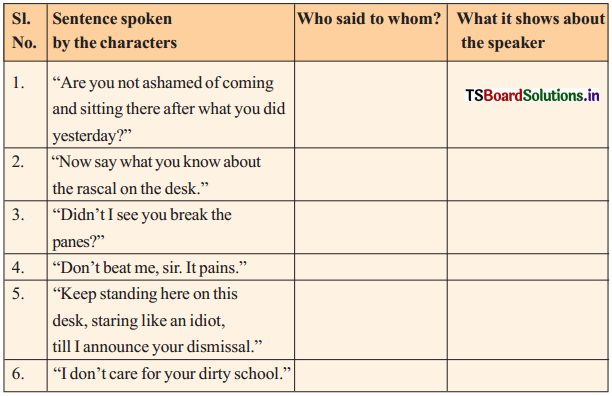
Answer:
| Sentences spoken by the character |
Who said to whom? |
What it shows about the speaker |
| 1. “Are you not ashamed of coming and sitting there after what you did yesterday?” |
The headmaster said to the children. |
It shows his authority and anger. |
| 2. “Now say what you know about the rascal on the desk.” |
The headmaster said to the peon. |
It shows his authority and anger. |
| 3. “Didn’t I see you break the panes? |
The peon said to Swaminathan. |
It shows his obedience to the headmaster and his authority on Swami. |
| 4. “Don’t beat me. sir. It pains.” |
Swaminathan said to the headmaster. |
It shows his innocence and mischievousness. |
| 5. “Keep standing here on this desk, staring like an idiot, till I announce your dismissal.” |
The headmaster said to Swaminathan. |
It shows his authority and anger. |
| 6. “I don’t care for your dirty school.” |
Swaminathan said to the headmaster. |
It shows his innocence and mischievousness. |

III. Work in Groups:
Give reasons for Swami’s decision to leave the school:
Answer:
- Swami was proved to be a mischievous boy.
- Swami was going to be dismissed from school. He knew that the headmaster would not allow him come to school.
- Swami could not bear the severe beating of the headmaster.
Vocabulary:
I. Pick out words from the story which are synonyms of the following words and use them in your own sentences.
Word.
Answer:
| Word |
Synonyms |
| beat |
flog, thrash, whack, rap |
| angry |
flushed, furious |
| rascal |
idiot, loafer |
| humiliation |
insult |

Own sentences :
1. beat : The teacher beat the student severely.
thrash : He thrashed the horse with his whip.
whack : Hemanth whacked the tree trunk with his stick.
rap : She rapped (on) the table to get everyone’s attention.
2. angry : Don’t disturb our boss. He is very angry.
flushed : You look a bit flushed – are you hot ?
furious : He’s furious about/at the way he’s been treated.
3. rascal : He’s a rascal. I can’t put up with his dishonest ways.
loafer : Uday is an idle loafer. He always spends time in gossip.
idiot : Some idiot left the tap running in the bathroom and there’s water everywhere.
cheat : He’s a cheat. I can’t believe his words.
4. humiliation : After the humiliation of last week’s defeat, they were back on form.
insults : She made several insults about her friend’s appearance.
II. Look at the following phrasal verbs taken from the text.
1. keep away
2. look around
3. look at
4. bring down
5. cut off
These phrases are verbs followed by prepositions or adverbial particles. You may understand that they are phrasal verbs.
You will notice that the following phrasal verbs ‘keep away’, ‘bring down’ and ‘cut off can be split as shown below.
Examples:
1. Keep the files away.
2. Bring the patient down.
3. Cut it off.
The other two phrasal verbs cannot be split.
Use the following phrasal verbs in your own sentences and decide whether you can split them as shown in the above examples.

Answer:
| Phrasal Verbs |
Sentences |
Can be split or not |
| look up |
She tried to look it up in the dictionary.
After a long time, the situation begins to look up. |
can be split |
| bring out |
They are bringing out their school magazine.
He is not very confident and he needs friend to bring him out. |
can be split |
| throw out |
They will throw you out if you don’t behave yourself.
The agitations threw out all our plans. |
can be split |
| look out |
When in crowded places, one must look out for pickpockets.
She will look out for you at the office. |
cannot be split |

III. Refer to a dictionary and pick out the phrasal verbs that begin with the following verbs and write down sentences using them.
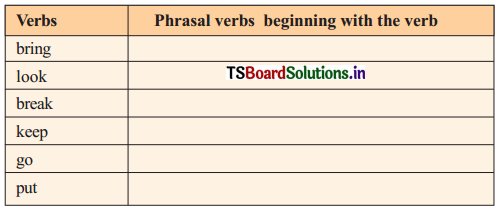
Answer:
Phrasal verbs with ‘bring’:
1. bring about = to cause something to happen
e.g. : Many great leaders brought about a change in Indian politics.
2. bring around = to change a view in someone’s view or opinion
e.g. : I used to eat meat until I saw a TV show, on vegetarianism which really brought me around.
3. bring back = to take back or return something.
e.g. : Can you bring back the book I lent you?
4. bring down = to fall or collapse
e.g. : The berlin Wall was brought down in 1989.
5. bring off = to succeed at something difficult / to accomplish something that seemed impossible.
e.g. : I can’t believe your wife let you come with us. How did you bring that off?
6. bring on = to cause something to appear
e.g. : The strong smell of flowers brought on sneezing from her. She is allergic to them.
7. bring out = to come out / release
e.g. : My favourite author is bringing out a new book next month.
8. bring up = to raise children or animals
e.g. : I was brought up at my grandmother’s village.
Phrasal verbs with ‘look’:
1. look after = to take care of / to make sure that someone is safe and well,
e.g. : I have to look after my son tonight.
2. look away = to turn your eyes away from someone or something that you were looking at.
e.g. : The accident was so horrible that I had to look away.
3. look for = to search for something or someone.
e.g. : I am looking for my black shirt.
4. look into = to investigate or examine.
e.g. : The manager promised to look into my complaint.
5. look out = to be careful.
e.g. : look out! There is a broken bottle near your foot.
6. look through = to examine something, usually quickly.
e.g. : I must look through this report to know the full story.
7. look up = to search for information (usually in a book).
e.g. : I need to look that word up in the dictionary.
8. look up to = to respect or admire someone.
e.g. : I really look up to my father.

Phrasal verbs with ‘break’:
1. break down = go out of order
e.g. : His health broke down as a result of the strain of work.
2. break in = interrupt
e.g. : It’s bad manners to break in when someone talks to others.
3. break into = entry by force
e.g. : The thieves broke into the house.
4. break off = discontinue
e.g. : We cannot brek the addict off his habit of taking some drugs.
5. break up = amuse greatly
e.g. : The mimicry of those little children broke me up and I laughed heartily.
6. break out = start suddenly
e.g. : 1. It is unhappy to hear that cholera broke out in a village nearby.
2. The First World War broke out in 1914.
Phrasal verbs with ‘keep’:
1. keep around = keep something’near you
e.g. : I keep a dictionary around when I’m doing my homework.
2. keep at = continue with something difficult
e.g. : She found the course hard but she kEPT AT it and completed it successfully.
3. keep away = not allow someone near something
e.g. : Medicines should always be kept away from children.
4. keep back = maintain a safe distance
e.g. : The police told the crowd to keep back from the fire.
5. keep down = not vomit
e.g. : The food was so horrible that I struggled to keep it down.
6. keep from = control yourself, refrain
e.g. : I could not keep from arguing with her.
7. keep in = not allow someone out
e.g. : The teacher kept the students in after school because they had misbehaved.
8. keep off = not talk about
e.g. : She kept off the subject of her divorce.
9. keep on = continue
e.g. : He kept on trying and succeeded in the end.
10. keep out = not allow someone to enter
e.g. : The police kept the demonstrators out of the building.
11. keep to = stay within limits
e.g. : Please keep to the path.
12. keep up = not let someone go to bed
e.g. : My neighbors kept me up till after 4 am with their loud music last night.
13. keep up at = continue, not quit
e.g. : Learning a language is difficult, but if you keep up at it, you’ll succeed in the end.
14. keep up with = move at the same rate
e.g. : He walks too fast and it’s really hard to keep up with him.

Phrasal verbs with ‘go’:
1. go about = deal with something .
e.g. : How should I go about telling her the bad news?
2. go across = move to another side or place
e.g. : He went across to the opposition.
3. go after = chase, try to get
E.g. : The cat went after the pigeon, but it flew away.
4. go against = lose a decision or a verdict of a court
e.g. : If the decision goes against me, I’ll go the High Court.
5. go ahead = proceed
e.g. : The construction of the bypass went ahead despite the protests from environmentalists.
6. go ahead with = proceed
e.g. : We now intend to go ahead with the final stage of the project.
7. go along with= accept a decision or suggestion
e.g. : I didn’t really agree, but I went along with the decision because I was in the minority.
8. go around = circulate
e.g. : A rumour is going around about Raju.
9. go at = attack or approach something with vigour
e.g. : She went at her dinner like she hadn’t eaten for days.
10. go away = leave a place or disappear
e.g. : This drug should make the pain go away.
11. go back = have a long history
e.g. : He and I go back a long way- we were at school together.
12. go back on = break a promise
e.g. : The government has gone back on their promise not to raise taxes.
13. go before = precede
e.g. : We can’t ignore what has gone before and pretend that everything has been OK.
, 14. go below = leave the top deck of a ship
e.g. : The captain told the passengers to go below when the storm started.
15. go by = the passing of time
e.g. : Ten years went by before we saw each other again.
16. go down = decrease, get smaller
e.g. : The price of scanners has gone down recently.
17. go down to = be defeated
e.g. : Usha went down to Sindhu in a thrilling game.
18. go down with = fall ill
e.g. : She went down with a vims.
19. go for = be attracted to
e.g. : She tends to go for new clothes.
20. go forth = travel abroad, leave a place
e.g. : They went forth to spread their message.
21. go forward = move clocks ahead
e.g. : The clocks move forward an hour on Sunday.
22. go in = go to hospital for treatment, surgery, etc.
e.g. : He went in for a triple bypass operation two days ago.
23. go in for = enter a competition or sit an exam
e.g. : He went in for the photography prize, but didn’t win.
24. go In with = form a union or alliance
e.g. : They’re going to go in with the T.D.R
25. go into = enter a profession, hospital, trade, market .
e.g. : She went into banking after she’d finished university.
26. go off = go bad
e.g. : The milk went off because I forgot to put it in the fridge.
27. go off with = steal
e.g. : He went off with my credit cards.
28. go on = continue
e.g. : He went on and on talking and I was so bored.
29. go on about = talk too much
e.g. : He’s always going on about his kids.
30. go on with = continue doing
e.g. : Please go on with your work.
31. go out = stop burning, be extinguished
e.g. : The candle went but and left us in darkness.
32. go out for = become a candidate, apply for something.
e.g. : She went out for a place oh the team.
33. go out to = feel sympathy with someone
e.g. : Our condolences go out to all the families who have lost people in this tragic accident.
34. go round = visit
e.g. : I went round last night to see them.
35. go through = experience
e.g. : You wouldn’t believe what I went through when I was ill!
36. go under = sink
e.g. : The ship went under in a heavy storm.
37. go with = accompany.
e.g. : A lot of benefits go with the job.
38. go without = not have
e.g. : 1 had to go without lunch today because I didn’t have any time.

Phrasel verbs with ’put:
1. put away = put something back in the correct place
e.g. : He put the dictionary back on the shelf after he’d finished the crossword.
2. put back = rearrange something for a later time
e.g. : The work has been put back until November the seventeenth.
3. put by = save for the future
e.g. : I try to put some money by every month.
4. put down – kill an animal because it’s old, ill, etc.
e.g. : He had his dog put down because it has been for a long time.
5. put down for = commit to make a payment
e.g. : put me down for Rs. 5 per mile.
6. put down to = give as an explanation
e.g. : He didn’t score many, but we can put that down to inexperience.
7. put in = install
e.g. : They had to put in a whole new central heating system because the house was so cold.
8. put in for = make a request
e.g. : He put in for a transfer to the new branch.
9. put off = postpone
e.g. : The concert’s been put off until next month because the singer’s got a throat infection.
10. put on = get fat
e.g. : He’s put on a lot of weight since he gave up smoking.
11. put out = disturb or trouble someone
e.g. : Would it be putting you out greatly if I asked to lend me some money.
12. put through = connect someone by phone
e.g.: Could you put me through to 9849950350?
13. put towards = make a financial contribution
e.g. : She put Rs. 500 towards the cost of the repairs.
14. put up = allow someone to stay at your house for a night or a few days.
e.g. : A stranger put me up for the night because I’d missed the last bus and there were no night buses running.
15. put up with = tolerate
e.g. : I can’t put up with my neighbour’s noise any longer; it’s driving me mad.

Grammar:
I. Read the following imaginary conversation between Swami and the headmaster.
Headmaster : Why didn’t you come to school yesterday?
Swami : Sir, my mother was suffering from fever.
Headmaster : I don’t believe your words. You always say something or the other to escape from school.
Swami : I’m speaking the truth, sir.
Headmaster : Well, I’ll come to your house tomorrow and talk to your parents.
In the indirect speech, the above conversation can be written like this.
The headmaster asked Swami why he had not come to school the day before. Swami replied respectfully that his mother had been suffering from fever. The headmaster retorted that he did not believe his words and added that he always said something or the other to escape from school. Then Swami replied respectfully that he was speaking the truth. Then the headmaster told him that he would go to his house the next day and talk to his parents.
As you can see, while converting the direct speech into indirect speech, the words in the bold are added to express the feelings, emotions, attitudes of the speaker and the sequences of the actions.
Read the following imaginary conversation between Swami and his father:
Swami’s Father : My dear Swami, why are you looking so dull? Why haven’t you gone to school today?
Swami : Daddy, I don’t like the school. The headmaster beats me every day.
Swami’s Father : Why does your headmaster beat you every day without any reason? I’m sure you must be causing a lot of nuisance in school.
Swami : No, Dad. The headmaster beats all my friends in the same way.
Swami’s Father : OK. What do you want to do now? Don’t you go to school and continue your studies?
Swami : No, Dad. I’ll join some other school.
Now change the conversation Into Indirect speech.
Answer:
Swami’s father asked him why he was looking so dull and he had not gone to school that day. Swami replied that he did not like the school because the headmaster beat him every day. but Swami’s father asked him why his headmaster beat him every day without any reason. He said that he was sure he must be causing a lot of nuisance in school.
Swami told his father that it was not and that the headmaster beat all his friends in the same way. Swami’s father agreed with him and asked him what he wanted to do then. He asked him whether he did not go to school and continue his studies. Swami replied that he was not. He said that he would join some other school.
Detailed notes on Direct Speech and Indirect Speech:
We may report the words of a speaker in two ways.
1. Direct Speech
We may quote the actual words of the speaker. This method is called Direct Speech.
2. Indirect Speech
We may report what he said without quoting his exact words. This method is called Indirect Speech or Reported Speech.
Example:
Direct : Clinton said, “I am very busy now.”
Indirect : Clinton said that he was very busy then.
Direct : He said, “ My mother is writing a letter.”
Indirect : He said that his mother was writing a letter.

How to change Direct to Indirect Speech?
It will be noticed that in Direct Speech, we use inverted commas to mark off the exact words of the speaker. In Indirect Speech we do not use the inverted commas.
It will be further noticed that in changing the above Direct Speech into Indirect speech, certain changes have been made.
Thus:
i. We have used the conjunction ‘that’ before the Indirect Statement.
ii. The pronoun “I” is changed to “HE”. (The Pronoun is changed in Person)
iii. The verb “am” is changed to “was”. ‘
iv. The adverb “now” is changed to “then”.
Rules for changing Direct into Indirect Speech :
A. When the reporting or principal verb is in the Past Tense, all the Present Tenses in the Direct Speech are changed into Past Tense.
a. A simple present tense becomes simple past tense.
Example:
Direct : He said, “I am unwell.”
Indirect : He said that he was unwell.
b. A present continuous tense becomes a past continuous.
Example:
Direct : He said, “ My mother is writing a letter.”
Indirect : He said that his mother was writing a letter.
c. A present perfect becomes a past perfect.
Example:
Direct : He said, “I have passed the examination.”
Indirect : He said that he had passed the examination.
d. As a rule the simple past tense in the Direct Speech becomes the past perfect tense in Indirect Speech.
Example:
Direct : He said, “His horse died in the night.”
Indirect : he said that his horse had died in the night.
NOTE :
The ‘shall’ of the future is changed into ‘should’.
The ‘will’ of the future is changed into ‘would’.
The ‘can’ and may of the future are changed into ‘could’ and ‘might’ respectively.
B. The tenses will not change if the statement is still relevant or if it is a universal truth. We can often choose whether to keep the original tenses or change them.
Examples:
Direct : “I know her address”, said John.
Indirect : John said that he knows/knew her address.
In this Indirect Speech, both the past tense and the present tense make the sentence a correct one.
Direct : The teacher said, “The earth goes round the sun.”
Indirect : The teacher said that the earth goes round the sun.
Direct : She said, “German is easy to learn.”
Indirect : She said that German was/is easy to learn.
The past tense is often used when it is uncertain if the statement is true or when we are reporting objectively.
C. If the reporting verb is in present tense, the tenses of the Direct Speech do not change. For example, we may rewrite the above examples, putting the reporting verb in the present tense.
Examples :
Direct : He says, “I am unwell.”
Indirect : He says that he is unwell.
Direct : He says, “ My mother is writing a letter.”
Indirect : He says that his mother is writing a letter.
Direct : He says, “I have passed the examination.”
Indirect : He says that he has passed the examination.
Direct : He says, “His horse died in the night.”
Indirect : he says that his horse died in the night.
D. The pronouns of the Direct Speech are changed where necessary, so that their relations with the reporter and his hearer, rather than with the original speaker are indicated.
Direct : He said to me, “I do not believe you.”
Indirect : He said that he did not believe me.
Direct : She said to him, “I do not believe you.”
Indirect : She said to him that she did not believe him.
Direct : I said to him, “I did not believe you.”
Indirect : I said to him that I did not believe him.
Direct : I said to you, “I do not believe you.”
Indirect : I said to you that I do not believe you.

E. Words expressing nearness in time or places are generally changed into words expressing distance.
Examples:
Direct : He said, “I am glad to be here this evening.”
Indirect : He said that he was glad to be there that evening.
Direct : He said, “I was here yesterday.”
Indirect : He said that he was there the day before.
Now, let us see the words which get changed when the Direct Speech is changed into Indirect Speech.
Now becomes then
Here becomes there
Ago becomes before
Thus becomes so
Today becomes that day
Tomorrow becomes the next day
Yesterday becomes the day before
Last night becomes the night before
This becomes that
These becomes those
F. How the questions used in the Direct Speech are changed into Indirect Speech?
In reporting questions, the Indirect Speech is introduced by such verbs as asked, inquired, etc…
Examples:
Direct : He said to me, “What are you doing?”
Indirect : He asked me what I was doing.
Direct : A stranger askcid me, “Where do you live?”
Indirect : A stranger enquired where I lived.
Direct : The Policemen said to us, “Where are you going?”
Indirect : The Policemen asked us where we were going.
Direct : He said, “Will you listen to such a man?”
Indirect : He asked them whether they would listen to such a man.
Direct : His angry mother jeered, “Do you suppose you know better than your father?”
Indirect : His angry mother jeered and asked whether he supposed that he knew better than his father.
G. How the Commands and the Requests in the Direct Speeches are changed when the Direct Speeches are changed into Indirect Speeches?
In reporting commands and requests, the Indirect Speech is introduced by some verb expressing commands and requests, and the Imperative Mood is changed into Infinitive Mood.
Examples:
Direct : Raja said to John, “Go away.”
Indirect : Raja ordered John to go away.
Direct : He said to Mary, “Please wait here till I return.”
Indirect : He requested Mary to wait there till he returned.
Direct : “Call the first witness”, said the Judge.
The Judge commanded them to call the first witness.
Direct : He shouted, “Let me go.”
Indirect : he shouted to them to let him go.
Direct : He said, “be quite and listen to my words.”
Indirect : He urged them to be quite and listen to his words.
H. How the Exclamation and the Wishes in the Direct Speeches are changed when the Direct Speeches are changed into Indirect Speeches?
In reporting exclamation and wishes, the Indirect Speech is introduced by some verb expressing Exclamation and Wishes.
Examples:
Direct : He said, “Alas! I am undone”.
Indirect : He exclaimed sadly that he was undone.
Direct : Alice said, “How clever I am!”
Indirect : Alice exclaimed that he was very clever.
Direct : He said, “bravo! You have done well.”
Indirect : He applauded him, saying that he had done well.
Direct : “So help me, Heaven!” he cried, “I will never steal again.”
Indirect : He called upon Heaven to witness his resolve never to steal.

II. Noun Clause:
Look at the sentences taken from the story.
1. One student said that he had an attack of a headache.
This sentence has two clauses.
a. One student said (Principal clause)
b. that he had an attack of a headache. (Subordinate clause)
The Subordinate clause is the object of the verb ‘said’. It is a noun clause.
The noun clause can also appear in the subject position as can be seen in the following sentence.
2. What you say is not clear to me.
If we replace the underlined part with ‘it’ in the above sentence, the sentence structure will be complete.
Note : Sometimes the word ‘that’ (conjunction) can be left out in spoken English,
e. g. : He felt that punishment was not enough, (that- adjective)
Now read the following passage carefully and identify the noun clauses. Replace the underlined words, ‘that‘so’ and ‘it’ with suitable noun clauses.
The headmaster entered the class furiously and said that he wanted to know the reason for the absence of some students in the class the day before. One student said that he had suffered from a severe headache. The headmaster said, “I don’t believe that”. The second said that somebody stopped him from coming to school.
The headmaster said, “I don’t think so”. The third said that he too had suffered from a bad headache. On hearing that the headmaster shouted in anger. The fourth said that he had suffered from a terrible toothache. The headmaster said, “I don’t believe it”. The fifth said, “My grandmother died suddenly”. The headmaster retorted that he would ascertain it. He said, “I will come to your house tomorrow to know the fact.”
Answer:
(a) Identifying noun phrases
Note : the underlined parts are noun phrases.
The headmaster entered the class furiously and said that he wanted to know the reason for the absence of some students in the class the day before. One student said that he had suffered from a severe headache. The headmaster said, “I don’t believe that”. The second said that somebody stopped him from coming to school. The headmaster said, “I don’t think so”. The third said that he too had suffered from a bad headache. On hearing that the headmaster shouted in anger. The fourth said that he had suffered from a terrible toothache. The headmaster said, “I don’t believe it”. The fifth said, “My grandrriother died suddenly”. The headmaster retorted that he would ascertain it. He said, “I will come to your house tomorrow to know the fact.”
(b) Replacing the words ‘that’, ‘so’ and ‘it’ with suitable noun clauses :
The headmaster entered the class furiously and said that he wanted to know the reason for the absence of some students in the class the day before. One student said that he had suffered from a severe headache. The headmaster said, “I don’t believe you had suffered from a severe headache.” The second said that somebody stopped him from coming to school.
The headmaster said, “I don’t think somebody stopped you from coming to school”. The third said that he too had suffered from a bad headache. On hearing that the headmaster shouted in anger. The fourth said that he had suffered from a terrible toothache. The headmaster said, “I don’t believe you had suffered from a terrible headache.” The fifth said, “My grandmother died suddenly”. The headmaster retorted that he would ascertain it. He said, “I will come to your house tomorrow to know the fact.”

III. Editing:
Read the following passage and edit (correct) the underlined parts.
Swami went home and says that the headmaster beats him severely. The parents asked that why the headmaster had beaten him. Swami said that the headmaster beats him yesterday. Swami’s father said why the headmaster has beaten him without any cause. Swami replied to his father that the headmaster beats him every day. Swami’s mother told to Swami to attend the classes regularly.
Answer:
Swami went home and said that the headmaster beat him severely. The parents asked why the headmaster had beaten him. Swami said that the headmaster beat him the day before / the previous day. Swami’s father asked why the headmaster had beaten him without any cause. Swami replied that the headmaster beat him every day. Swami’s mother told Swami to attend the classes regularly.
Writing:
I. What do you think Swami might have thought after he had left his school? Write down his reflections in the form of a diary.
Answer:
Saturday
20th, February, 20xx
9 pm
Dear Diary,
What a bitter day today is !
What a wretched school ! How cruelty has taken the sha*jpe of this headmaster ? Don’t they understand our feelings ? Weren’t they too children at one time ? Didn’t they cause any nuisance when they were children ? Yes, I did break the panes in a moment of childish hehaviour. Have I not been honest in not denying the charge ? Is it not enough to scold us in the whole class ? He went on insulting us, beating us and threatening us with dismissals. Is it the way to correct us ? Shouldn’t they give us a chance to set ourselves right ? I wish I weren’t a student of this horrible school.
Thank God ! At least now, I gathered enough courage to come out of the school. I can join some other school. I think any other school will definitely be better than this bloody school. Any how, I too should and will be more careful about my behaviour and freinds.
I should think of my studies and parents too. Yes, in one way, the incident is a lesson for me.
I should make utmost use of it.
Swami

II. Construction of a Narrative.
Look at the concluding part of the story.
He restrained the tears that were threatening to rush out, jumped down, and, grasping his books, rushed out, muttering, ‘I don’t care for your dirty school.
Now imagine what happens to Swami after going away from school. Write a narrative which should include dialogues, sensory perceptions, etc.
You may include things such as the following.
- Swami rushed out from the class.
- His parents asked him what happened at school.
- His mother looked at the scars on his shoulders.
- His father wanted him to go to school.
- Swami did not like to go to school.
Answer:
Swami rushed out from the school after the incident had taken place. He threw all his books on floor and began to cry loudly. He could not control himself. On seeing Swami, his mother and father came to him worriedly. They were surprised to see Swami crying. ‘What happened at school? Tell me’ asked his father. ‘I don’t go to school’, cried Swami angrily.
‘Oh! There are many scars on the shoulders’ showed the mother, ‘somebody has beaten him severely? bring the butter to apply on the scars.’
‘Tell me, what happened?’ asked the father once again.
‘I don’t go to school’ repeated Swami.
The father asked him in a commanding voice if Swami did not say what happened, he would go to school and know the fact. Then Swami opened his mouth &nd said that the headmaster beat him severely without any reason.
The mother, applying the butter on the scars on Swami’s shoulder, asked, ‘Dear, go and ask the headmaster why he did so.’
‘Swami, tell your father what happened in detail. If you say the truth, your daddy will go to school and settle the issue’ said the mother.
‘Mummy, ask daddy not to go to school. Nobody will care him at school. The headmaster is angry with me. Somebody broke the panes of the ventilators of his room. But he believed that 1 broke the panes.’
‘I will talk to your headmaster and settle the matter’ said the father.
‘Not only the headmaster but also the peon and everybody at school is against me’ cried Swami.
‘You need not worry. I will look after everything. Take rest for two days and then go to school’ said the father.
but Swami refused stubbornly to go to school. The mother asked Swami and his father to be calm at present. She said, ‘Things will settle in time.

III. Imagine that your Headmaster wanted to serve a notice to check the irregular¬ity of the students. Now, on behalf of your Headmaster prepare a notice for display.
Answer:
Z.P. HIGH SCHOOL, KHAMMAM
NOTICE
23 Feb. 20xx
PARENTS MEET
All the students of school are informed that our school is going to held a parents meet in order to check the irregularity of the students on 25 Feb 20xx Your parents are invited to attend the meeting to discuss the reasons and remedies for the irregularity of the students. The details of the meeting are as follows.
Date : 25 February 20xx
Time : 10 am
Venue : School Cultural Hall
Head Master
Study Skills:
I. Read the data given in the table and answer the questions that follow.
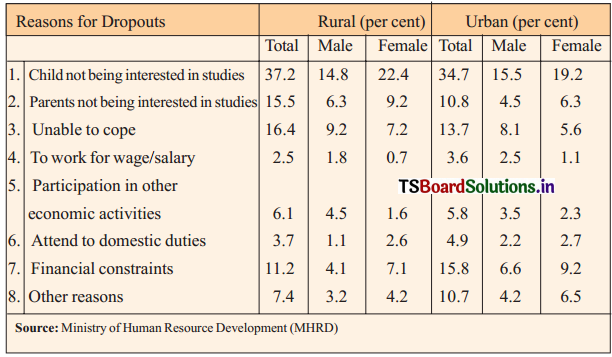
Answer the following questions:
Question 1.
What is the major reason for dropouts in rural and urban areas?
Answer:
‘Child not being interested in studies’ is the major reason for dropouts in rural and urban areas.
Question 2.
What percentage of female children are dropped out as their parents not being interested in their childrens studies in rural areas?
Answer:
9.2% of female children are dropped out as their parents not being interested in their children’s studies in rural areas.
Question 3.
Which is the less significant reason for dropouts?
Answer:
‘To work for wage/salary’ is the less significant reason for dropouts.
Question 4.
Which of the following statements are true with reference to the data given in the above table? Tick (S) the true statements.
a. The dropout-rate due to child not being interested in studies is more among the urban children than that of the rural children.
b. Participation in other economic activities is high among urban female children when compared with rural female children.
c. If we create interest in studies among the children, the literacy rate will increase in our country.
Answer:
c. If we create interest in studies among the children, the literacy rate will increase in our country.

II. Write a report on dropouts using the Information given in the above table.
You may begin the report like this.
This report is based on the data provided by MHRD for the year 1997 – 98 for children who dropped out in the age group of 5 – 14 years…
Include the following
1. The financial reasons for dropouts
2. Personal reasons for the dropouts
3. Whether the dropout rate is more among girls/boys
4. Whether the dropout rate is more among rural/urban
5. Measures to be taken up to minimise dropouts.
Answer:
This report is based on the data provided by MHRD for the year 1997-98 for children who dropped out in the age group of 5-14 years. Of all the reasons ‘child not being interested in studies’ is the major reason for dropouts in rural and urban areas. ‘To work for wage/salary’ is the less significant reason for dropouts. With reference to the female dropouts, it is high in rural areas.
It is observed that many children are out of school as they participate in other economic activities. Many girls are out of schools as they attend domestic duties both in the rural and the urban areas. Financial constraints also play a vital role in deciding the dropout rate. In total the dropout rate is high among girls in rural areas. One significant thing is if we create interest in studies among the children, the literacy rate will increase in our country.
Providing work to win a bread for dropouts children is an important remedy to decrease the number of dropouts. Providing notebooks, incentives to children, giving awareness on the importance of education in addition to scholarships, mid day meal, free uniforms and textbooks are the important solutions to minimise dropouts.
Listening:
Practise listening carefully. Then you will be able to speak.
Listen to the 2 speeches and answer the questions that follow.
Speeches:
Speech 1 :
Good evening to all the people present here today. It’s a pleasure to start this occasion by welcoming everybody. I welcome our headmaster to preside over the function. Now 1 would like to invite the honourable chief guest, our M.L.Ato come onto the dais. I welcome my teachers, my fellow-friends and schoolmates. Today we all have gathered here for the Annual Day celebration. I welcome you all and I hope you enjoy the programme.
Now I request our headmaster to start the function.
Thank you.
Speech 2:
I have a great pleasure in welcoming our principal to preside over the Children’s Day programme that we have today. It is a great privilege for me to invite our chief guest, the D.E.O. of our district, who has kindly consented to be the chief guest for the day, I also welcome other distinguished guests, who also have consented to be with us today despite their tight schedule. I cordially welcome my colleagues and non-teaching staff too. In today’s celebration our main heroes are our students. So I welcome them and their parents too along with all others.
I hope you enjoy every aspect of this event and request the president to begin the proceedings.
Thank you.

Answer the following questions:
Question 1.
Who is the speaker of the speech 1 ?
Answer:
The speaker of the speech 1 is a student of the school.
Question 2.
What is the occasion mentioned in the first speech?
Answer:
Annual Day celebration is the occasion mentioned in the first speech.
Question 3.
What is the occasion mentioned in the second speech?
Answer:
Children’s Day is the occasion mentioned in the second speech.
Question 4.
Who is the chief guest mentioned in the second speech?
Answer:
The DEO is the chief guest mentioned in the second speech.
Question 5.
Who is addressing the gathering in the second speech?
Answer:
A teacher or a lecturer is addressing the gathering in the second speech.
Oral Activity:
Imagine that you are the School Pupils’ Leader (SPL). Compere on the Republic Day celebrations in your school.
You may include the following in your speech :
- Welcome address
- Inviting the guests onto the dais
- Importance of the occasion
- Request to continue the proceedings
- Vote of thanks
Answer:
1. Welcome address
A brilliant morning to every soul gracing the grand occasion of our Republic Day celebrations. A noble national festival and our patriotic feelings have brought us all together here. On this memorable event, I extend my warm welcome to you all and the greetings of the day too.
2. Inviting the guests onto the dais
Now I would like to invite our honourable headmaster to come over to the dais to preside over the proceedings. I feel it my privilege and pleasure to invite our distinguished guest of the day, our beloved collector on to the dais. Let us all extend our thunderous applause as our collector comes to grace the occasion. It is my pleasure to invite on to the dais our dear teachers who have won our hearts with their excellent teaching skills and touching attitude. Now, I would like to invite the VIPs who come to grace the occasion.
3. Importance of the occasion
As you all knew, we have gathered here to celebrate the 67th Republic Day in our school. My dear fellow students, parents and honourable guests, let us cherish each moment of the programme as it gradually unfolds, majestically moves ahead and colourfully culminates.
4. Request to continue the proceedings
May I now request the President of the programme to continue the proceedings.
5. Vote of thanks
1 feel it privilege to get an opportunity to propose a vote of thanks on this occasion. I, on behalf of our school, would like to mention our sincere thanks to our distinguished guest, our beloved collector for his priceless speech. Sir, we are all inspired by your great words ! Now, I wish to express our gratitude to all the dignitaries for gracing the occasion. I also extend my thanks to the parents for their presence on the occasion.
I thank one and all.
Thank you.

Swami is Expelled From School Summary in English
(This -is an extract from the 2nd part of the 12th chapter (broken Panes) of the novel ‘Swami and Friends’ written by RK.Narayan)
Childhood is the theme of the novel ‘Swami and Friends’. Swami and Friends is the story of a 10-year-old boy. The central theme of the novel is growing up of young Swami. He is a spontaneous, impulsive, mischievous and yet a very innocent child. He is a student at Albert Mission School, a school established by the british.
The present extract describes what happened one day in the classroom.
The headmaster entered the class with a flushed face and a hard ominous look. He wanted to punish the mischievous children and read out the names of a dozen students angrily. Swaminathan was one of them. The headmaster gave them a lecture to correct their misbehaviour. He asked them whether they were not ashamed of what they had done the day before. He insisted on explanations from those who were absent yesterday.
He made the students stand on the desks. The students told lies to escape from the headmaster’s anger, but the headmaster knew why they did not come to school yesterday. So he scolded them and gave them blows with a cane. Swami was watching the scene from behind. When he was watching the scene, he saw Rajam, his friend and classmate, with pink ears. This means Rajam was angry with Swami because of some reason. Swami understood that Rajam was angry with him.
Swami’s turn came. Thinking of Rajam’s anger with him, he was incapable to speak. So he was deaf to the headmaster’s question to him. When the headmaster gave a rap on Swami’s body, he came to the real worid. The headmaster asked Swami why he had not come to school the day before. Swaminathan tried to protest by saying that he had never been absent, but the attendance register was there.
So he gave some disjointed explanations for his absence. The headmaster was not satisfied with Swami’s explanations and brought the cane sharply down on Swami’s right shoulder. Swami kept staring at the headmaster with tearful eyes, massaging with his left hand the spot where the cane was laid. The headmaster warned him that he would kill him if he did not give the right answer.
The headmaster turned to a boy and asked him to call the peon. On hearing this Swami thought that the headmaster was going to ask the peon to beat him. Swami thought of biting everybody dead if the peon beat him. The peon came. The headmaster asked the peon to tell him what he knew about that rascal (Swami) on the desk. The peon said that he saw Swami break the panes of the ventilators in the headmaster’s room.
Swami had no chance of escaping and stood staring foolishly. The headmaster gave another whack on Swami’s back. He beat Swami with a cane severely. When Swami asked the headmaster to stop beating, the headmaster brought down the cane four times again. He asked Swami to keep standing on the desk till he announced his dismissal.
The blows pained Swami very much. He could not bear the pain. He got a sudden flood of courage out of his desperation. He restrained the tears that were threatening to msh out. He jumped down, grasped his books and rushed out muttering that he didn’t care for his dirty school.

About the Author :
R. K. Narayan (10 October 1906 – 13 May 2001), (shortened from Rasipuram Krishnaswami Iyer Narayanaswami) was an Indian author whose works of fiction include a series of books about people and their interactions in an imagined town in India called Malgudi. He is credited with bringing Indian literature in English to the rest of the world. Swami and Friends, The Bachelor of Arts, The English Teacher and The Financial Expert are his popular works. The present extract is from Swami and Friends.
His narratives highlight social context and provide a feel for his characters through everyday life. In a writing career that spanned over sixty years, Narayan received’ many awards and honours. These include the AC Benson Medal from the Royal Society of Literature and the Padma Vibhushan, India’s second-highest civilian award. He was also nominated to the Rajya Sabha, the upper house of the Indian parliament.
Glossary:
flushed (adj) : red and hot
ominous (adj) : suggesting that something bad is going to happen
humiliated (v) : make somebody feel ashamed
eminence (n) : the quality of being highly accomplished and respected (here satirical)
deserved (v) : had eligibility to get something
flog (v) : beat with a stick as a punishment
ascertain (v) : find out
perspiration (n) : sweat
knuckles (n) : a part of a finger at a joint where the bone is near the surface
cane (n) : stem of a plant/bamboo stick
resolutely (adv) : showing great determination
Intently (adv) : attentively
pink ears : ears that appear red when somebody is angry with
intolerable (adj) : unacceptable
acute (adj) : very serious or severe
rap (n) : severe blow with a cane
impulse (n) : a sudden strong wish
gaol (n) : jail (old use)

disjointed (adj) : not communicated or described in a clear way
discreet (adj) : tactful /careful in saying something
distress (n) : extreme pain
staring (v) : looking at somebody or something for a long time
massaging (v) : rubbing and pressing
stammered (v) : spoke with difficulty repeating words or sounds
peon (n) : a person with an unimportant job
thresh (v) : beat repeatedly and violently with a stick
sinister (adj) : seeming evil or dangerous
grunted (v) : made a short low sound in the throat
panes (n) : glasses of a window
ventilators (n) : an opening for letting fresh air come into a room
whack (n) : the act of hitting vigorously
brigand (n) : a member of a gang of bandits or thieves
unconsciously (adv) : without being aware
defiant (adj) : openly refusing to obey something
deny (v) : say something is not true
charge (n) : accusing somebody of doing something wrong
ejaculated (v) : said or shouted something suddenly
pore (n) : small hole in skin
desperation (n) : anxiety / worry
restrain (v) : keep under control
grasp (v) : seize and hold firmly
![]()
![]()
![]()
![]()
![]()
![]()
![]()
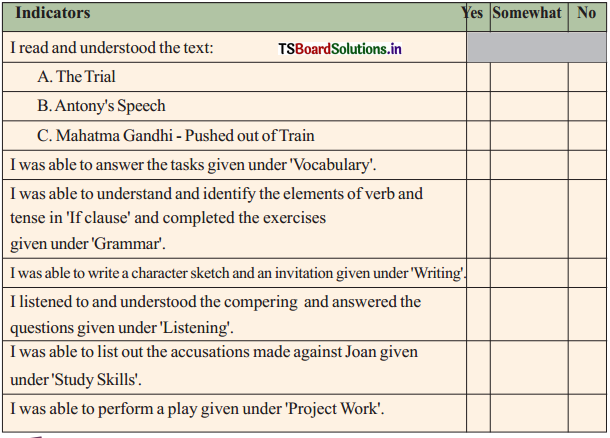
![]()
![]()
